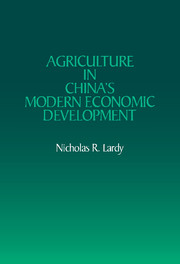Book contents
- Frontmatter
- Contents
- List of tables, figures, and maps
- Preface
- Map 1 The provinces of the People's Republic of China
- 1 The role of agriculture
- 2 Planning and allocative efficiency
- 3 Prices and intersectoral resource transfers
- 4 Living standards and the distribution of income
- 5 Prospects for reform
- Appendixes
- Notes
- References
- Index
3 - Prices and intersectoral resource transfers
Published online by Cambridge University Press: 16 September 2009
- Frontmatter
- Contents
- List of tables, figures, and maps
- Preface
- Map 1 The provinces of the People's Republic of China
- 1 The role of agriculture
- 2 Planning and allocative efficiency
- 3 Prices and intersectoral resource transfers
- 4 Living standards and the distribution of income
- 5 Prospects for reform
- Appendixes
- Notes
- References
- Index
Summary
A central aspect of the role of agriculture in modern economic growth is its market and factor contributions. One of agriculture's market contributions, its provision of food to the urban sector, was analyzed partially in the previous chapter. This chapter focuses on agriculture's factor contribution to growth, particularly its role in financing industrialization. Although Western scholars have intensively studied China's agriculture, little work has been undertaken on intersectoral resource flows. With the notable exception of two pioneering works by Shigeru Ishikawa (1967a, 1967b), most published studies treat the subject cursorily, usually assuming that the slogan “agriculture first” implies that agriculture was a significant net beneficiary from intersectoral resource flows, especially after the crisis of 1959–61.
The purpose of this chapter is not to determine the magnitude of intersectoral flows at specific times since the end of the civil war, but to ask whether development policy has been balanced on the basis of the first criterion proposed in Chapter 1: Has the intersectoral allocation of investment resources equalized the marginal rate of return to investment in agriculture and industry? Alternatively the focus could be formulated in terms of whether policy has maximized successfully the interactions between agriculture and other sectors of the economy.
- Type
- Chapter
- Information
- Agriculture in China's Modern Economic Development , pp. 98 - 145Publisher: Cambridge University PressPrint publication year: 1983



